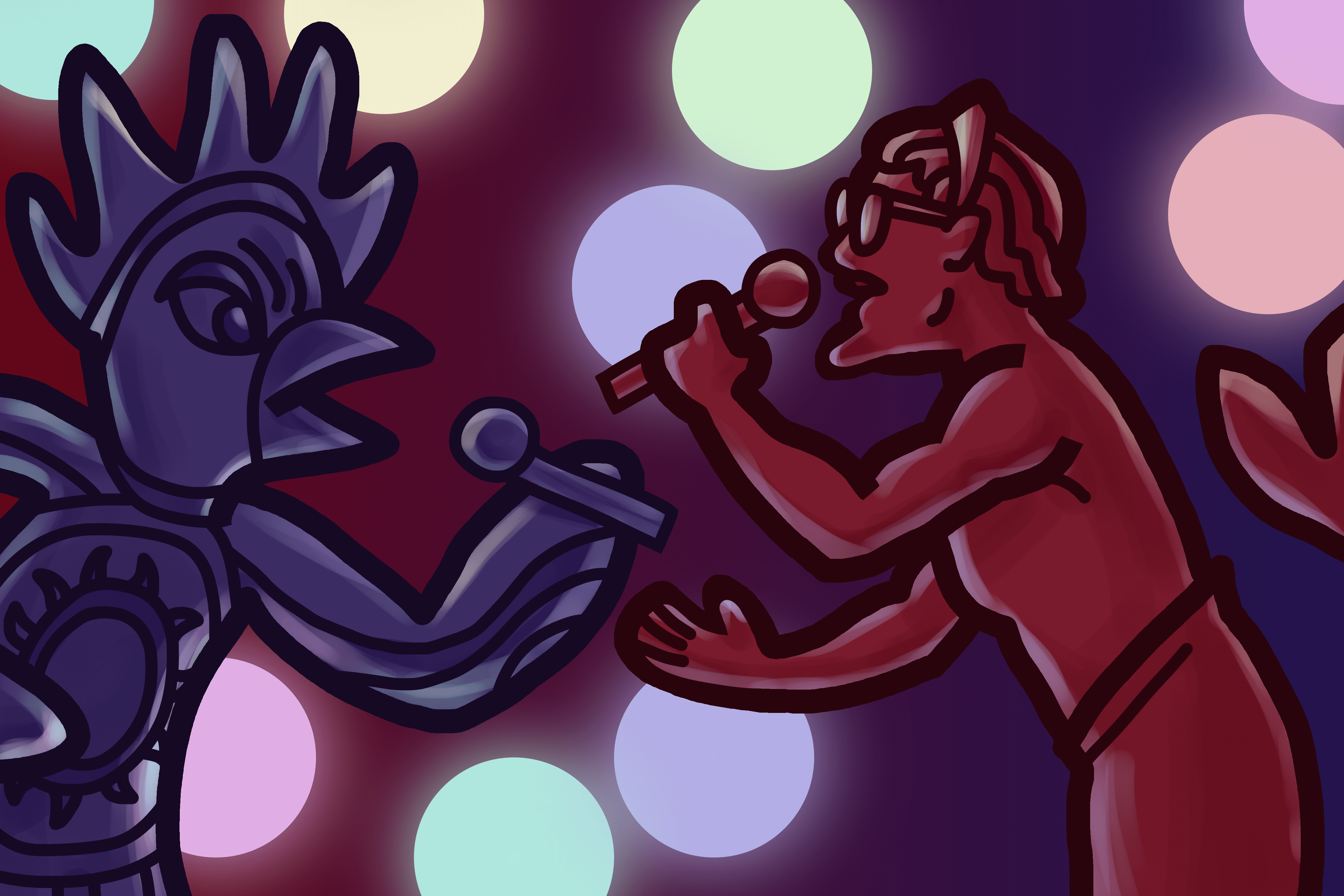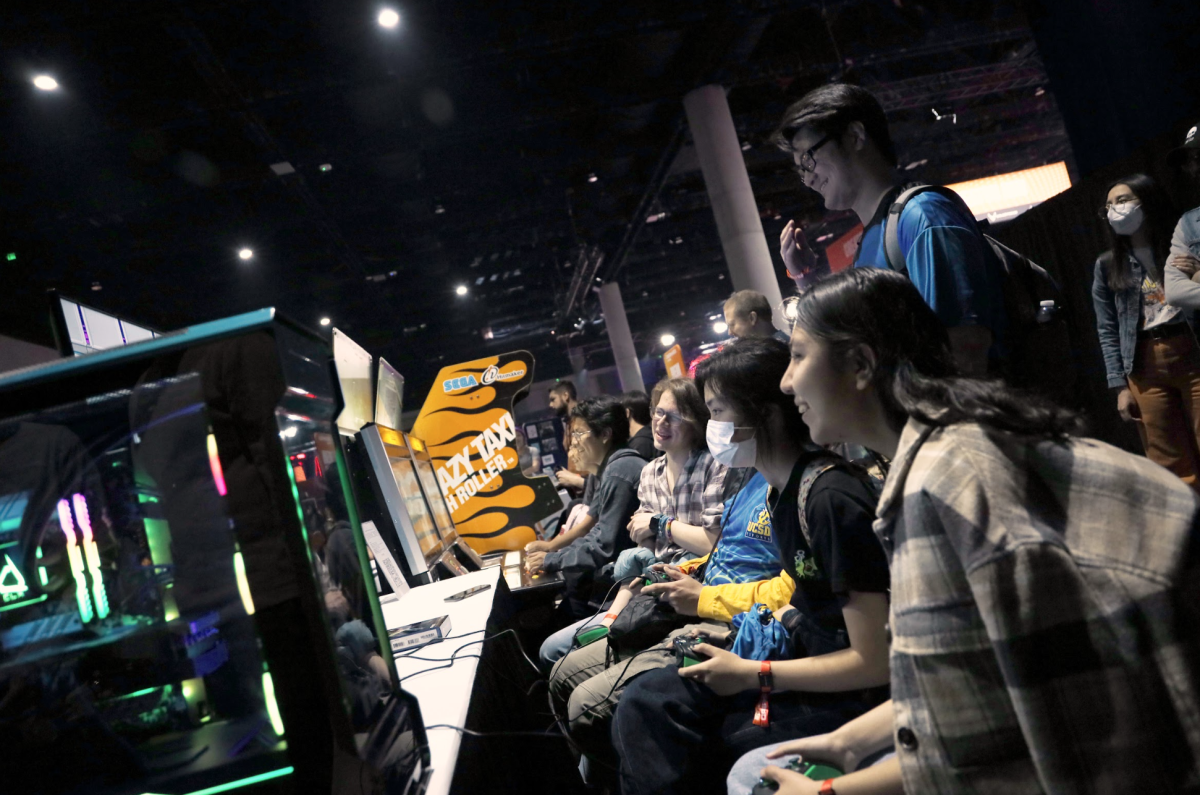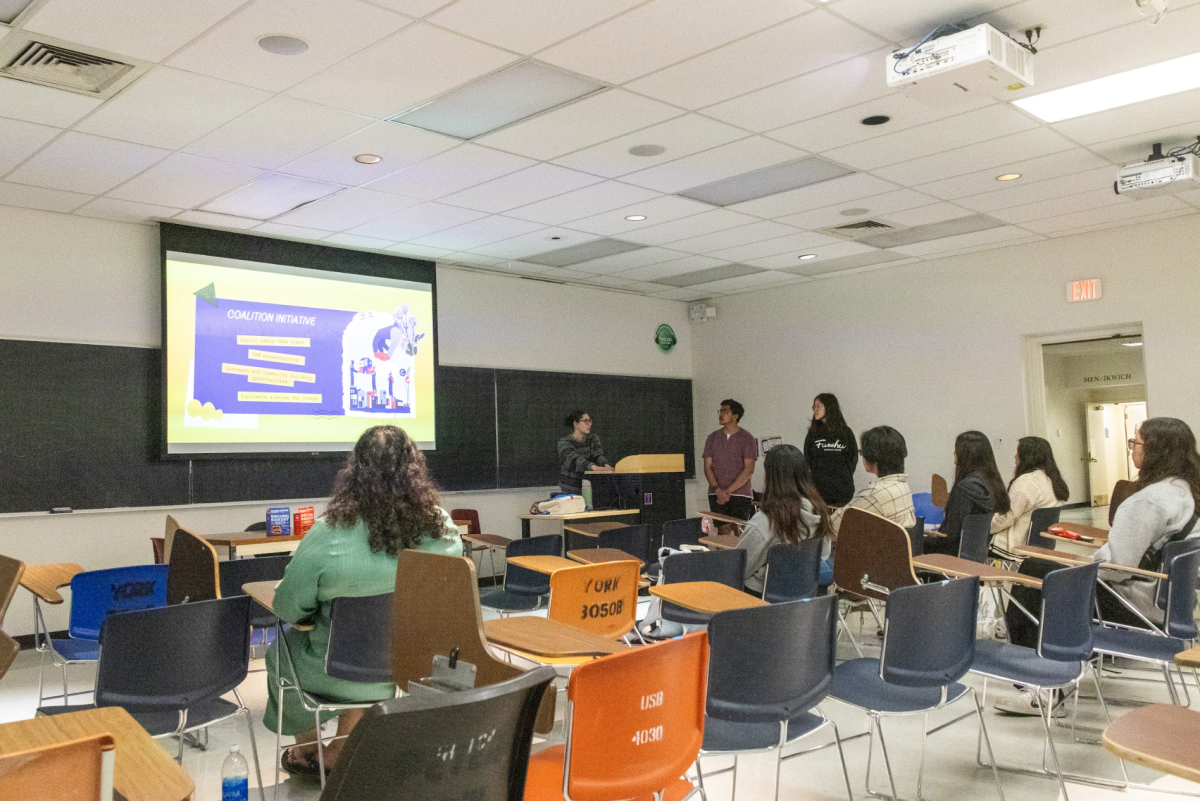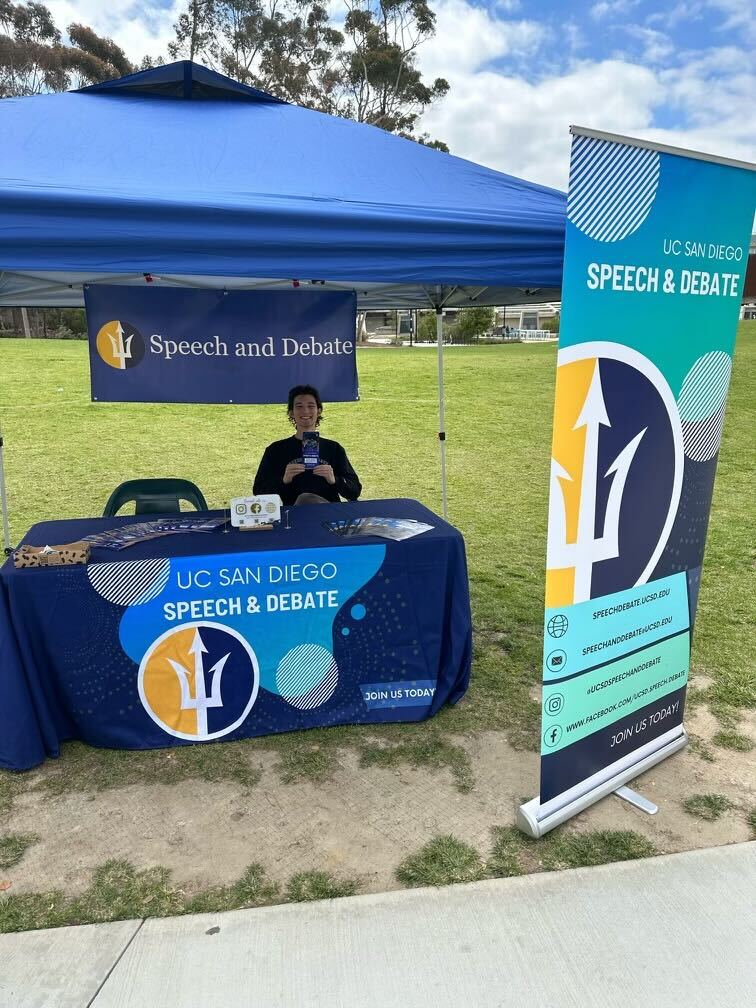**Warning: article contains strong language.
Acertain kind of energy fills the air. In the bathroom just outside The Loft, a young performer can be heard in a toilet stall nervously practicing his lines, waiting for his moment on stage to come. Inside The Loft, the show is slowly starting up; we may be at UCSD, but with the DJ playing beats from classics like “California Love,” the atmosphere recalls the West Coast hip-hop scene in the 1990s. Onstage the emcees, looking no different from your typical fresh-faced UCSD undergrad, bust rhymes with such confidence and fluidity that you feel hesitant to call them amateurs. What’s most amazing is that no planning goes into much of what they perform — what we see onstage is true freestyle rap.
This is Welcome Back Cypher, the first show of the year for Shots Fired, a battle rap group dedicated to bringing hip-hop culture to UCSD — or, as they would put it, “Make UCSD lit again.” When we approached a few of the rappers after the show to schedule interviews for the next day, they wouldn’t have it; they insisted that we do it right then and there while the feeling of the moment was still alive. The enthusiasm and candor they display when they rap shined through in their interviews. Rarely did they punctuate their straightforward, profanity-laced statements with an “um” — they answered each question with so much ease that it seemed like they knew them in advance.
The Origin
To truly tell the story of Shots Fired we need to look beyond the history of the organization itself; we need to look back to the members’ childhoods when they all, one way or another, discovered hip-hop. For Thurgood Marshall College senior Matt Kucirek (“K Philosophy”), hip-hop called to him — profanity and all — from an incredibly young age.
“It’s just what I listened to growing up. I remember I was like four, five years old maybe and Get Rich or Die Tryin’ came out. I used to live in El Cajon, and I went to The Warehouse in El Cajon, which is the CD store, and I remember I wanted to buy Get Rich or Die Tryin’. The motherfuckers wouldn’t let me buy Get Rich or Die Tryin’; my mom had to be there,” Kucirek told the UCSD Guardian. “So I remember getting my mom — she’s in the car, I didn’t walk to the fucking Warehouse — and I’m like ‘Mom, you need to be here for me to buy this.’ She’s like, ‘It says explicit content,’ and I ask, ‘What does that mean?’ She goes, ‘It means they say bitches and hoes and stuff like that.’”
As the years went by, Kucirek kept listening to rap, finding it a useful outlet for what he felt.
“I felt it released the emotions that I had inside of me, you know, as a pent up, angry little white kid,” he remarked.
He began writing his own lyrics at the early age of eight and then, after four years in which he barely listened to hip-hop, a friend challenged him to a rap battle and his connection to hip-hop culture became “a done deal.”
Similarly, Ryan Perez, a 27-year-old recent graduate of UCSD who still participates in Shots Fired, was thrown into the world of hip-hop early in life due to its constant presence in the world around him. According to Perez, growing up in the Los Angeles area in the ‘90s meant that getting into hip-hop was hardly a choice.
“I grew up in LA in the ‘90s, so it was impossible not to — I live literally like 15 minutes away from Compton where NWA dropped, and The Chronic and The Chronic 2001 … and Long Beach was right down the road with Snoop Dogg,” Perez told the Guardian. “Pretty much the epicenter of West Coast hip-hop happened in my backyard, and so it was kind of hard not to be influenced by it.”
Having two musicians as brothers gave Perez even more encouragement to get into making music. Over the years he has learned to play a wide variety of instruments, from drums to guitar to even the trumpet (though admittedly not very well). Ultimately, though, he found his calling in hip-hop, an art form where he says he could find “my own voice, my own style, things that I wanted to talk about.”
As a young artist Perez also found inspiration in the emotional turmoil he sometimes went through, particularly after the death of his father which left him “an angry child” who turned to writing and poetry as a way to vent his feelings.
“So I picked up writing really young too. I remember writing these long, long songs and poems in like the eighth grade, like the weirdest shit. I still have the notebooks, I go back and read them sometimes — it’s the weirdest shit,” Perez said, laughing. “But over time my style developed, and I met people that encouraged me and told me that I could be good at it, and I started putting out my own music.”
Keeping the Passion Alive
The common thread that drew these two young musicians together at UCSD was their desire to continue making music even after they came to college, a time in their lives when many other young people tend to forget their earlier creative pursuits to focus on a more “serious” career. This is what drove the birth of Shots Fired three years ago, when Matt Kucirek and his longtime friend José Gonzalez (“Griffin”), by then battle-hardened veterans of the rap scene, began their first years at UCSD. Soon after moving to campus, Kucirek and Gonzalez learned that students could easily create their own organizations and realized that they could take advantage of this to create an outlet for their longtime passion.
“Wow, this shit doesn’t seem that hard. I gotta fill out some paperwork and that’s it, are you fucking kidding me? Free venues and all this shit?,” Kucirek recalls thinking. “So I was like, ‘You know what dude, we’re gonna make our own battle league, fuck the bullshit. We know we’re better than half those people out there, we know there [are] people here who are better than half those people out there.’”
The duo went about promoting their fledgling group throughout campus. Their early techniques for recruitment were, by their own admission, naive, but bold enough to attract attention.
“We went to Geisel and printed out a bunch of fliers with the 8 Mile photo on it and phone numbers that basically said, ‘If you wanna rap, call this number,’” Kucirek recalled. “That’s pretty much how it worked, and then people called us — surprisingly enough, we had enough people call us.”
The upstarts soon had their first show planned at Price Center Theater. This initial show underwhelmed their expectations, as the audience had not yet warmed up to the kind of frenetic energy that comes with battle rap performances. “The fuckers sat down, it was terrible,” Kucirek quipped.
Still, that first performance in Fall Quarter 2013 proved to be the start of a long series of gritty, high-energy shows and the creation of a vibrant hip-hop community made up of several passionate individuals. They have gone on to perform at most venues on campus, ranging from Outback Adventures Surf Shop to Porter’s Pub, which is where Perez discovered the group. Perez, then a sophomore working at Porter’s, had thought his involvement in hip-hop was through until he found Shots Fired.
“I met these young men right here who were trying to bring hip-hop culture, and it revived instantly,” Perez says. “The first time K and me were freestyling together we were finishing each other’s rhymes — like, not knowing each other, just finishing each other’s bars, just in sync. After that night I was just like ‘These are gonna be my homies here,’ and that’s pretty much been going on ever since.”
The up-and-coming org also piqued interest in people who previously hadn’t been very involved in the hip-hop community. Marshall junior D’ante Harper (“Tay Dot”) recalled discovering the group not at a performance but at a casual rap circle.
“I actually met them by the Triton statue. They had a little rap circle going, and it was a group of us just freestyling and whatnot and some dude making beatbox — it was fucking dope,” Harper said.
Harper initially got interested in battle rap from videos on Youtube before getting involved in the scene with Shots Fired.
“And I got to here, and I got into battle rap, and I started watching that on Youtube — my brother showed me — and I was like ‘That was awesome.’ Because it was like 8 Mile in the flesh, like a real-life movie, I was like ‘Aw, that’s dope, I wanna do that on the West Coast.’”
Being an MC
What stands out to anyone who attends a Shots Fired event is, as mentioned before, the members’ incredible ability to freestyle, something they take great pride in.
“In my opinion, if you can’t freestyle, don’t tell me you’re an MC,” Kucirek opined. “You can say you’re a rapper, that’s all fine and dandy, but for me it’s just — if I wanted to be an MC, if I wanted to be in the culture, you have to know how to spit right from off the top of the dome or else you ain’t shit. It’s that simple.”
Being able to come up with verses is not an easy task, admits Harper.
“Coming from someone who doesn’t freestyle, I’ve freestyled like four or five hours with them, that’s it, everything I do comes in the moment. Like, I write it down, and I just say it until I memorize it, I just repeat it, repeat it, repeat it like it’s a song. And it just works after a while, but the freestyle thing doesn’t just come as easy to me because my brain just doesn’t work like that, just connecting that quickly.”
For anyone daunted by the idea of freestyling, Kucirek and Perez have plenty of advice.
“Whenever you’re in front of people no one knows what you have planned to say — not a single person knows what you have planned to say — so when you fuck up just keep going,” advised Kucirek. “As soon as you stop people know you’ve fucked up. Otherwise, ‘That’s what I was supposed to do, what do you mean? Wanna see my notebook?’ That’s what I would say about people who fucking get worried about slipping up and shit: don’t. No one looks at your notebook.”
Perez takes another approach to the issue, noting that a lot of practice and thought can make you a better MC.
“I would say, first of all, not everything is off the cuff, I know for a fact that people prewrite things and kind of have them in their back pocket so when they need them it’s like a repertoire, they have something to go to,” Perez said. “Like, they’ve said the same two words and they know those rhyme, so the more you do it the more you have tools; you have a toolbox.”
Though the group does have its devoted members, they go out of their way to get newcomers involved at their shows, and they do continuously get a plethora of nonmembers to take the stage, some being seasoned MCs and others being novices who just want to give it a shot. Anyone with the courage to jump onstage and rap is welcome to take the microphone — in fact, Kucirek demands it.
“Raise your hand if you’re down to come up on this stage and rap right now,” Kucirek shouted in the middle of the performance at The Loft.
Several hands shot up, and the stage was soon flooded by students of all types. They freestyled about a number of things that mattered to them, from the state of American politics to the struggles of being an engineering student at UCSD.
“As long as you have fun — that’s what we’re here for,” shouted one MC as he encouraged aspiring rappers to come to the stage.
What the Future Holds
Though all three members are heavily invested in hip-hop as a form of expression and a way of life, they are, like the rest of us, students at UCSD, working toward completing majors that sometimes have little to do with the culture that they have come to cherish. Kucirek, for example, is studying applied mathematics, a major that he chose because of a math teacher who, as he puts it, “was the only one who didn’t seem like he hated his fucking job. He seemed happy.”
Looking forward, however, he seems to give little thought to making a career out of his major; instead, he seems drawn to continuing a career in hip-hop. He proudly tells us that he has an upcoming gig in Las Vegas, and that other members of Shots Fired have performed all over California, from Orange County to Fresno. Encouraged by these successes, he hopes to make a true career out of what is clearly his greatest passion.
“Because of Shots Fired we’ve had people go places, so hopefully that’s something I can always have in my life, something I can turn into a business, something I can do for money.” Kucirek said. “And if not, it’s always gonna be that when the homies come through there’s gonna be a session.”
Harper, who majors in creative writing, is somewhat different in that he does find a connection between his major and his passion for hip-hop. However, while he plans on staying involved with Shots Fired for a long time, he is not so sure he wants to choose hip-hop as a career.
“As far as ‘Am I gonna be actively performing?’ and all that, I don’t know because I’m a creative writing major, and I’m planning on writing books and movie scripts and stuff like that. So I might not necessarily have time, but if I can make time that would be the thing I plan to do.”
Perez, who currently works for University Centers advising A.S. services, can’t see how his relationship with hip-hop and music in general can ever end, come what may.
“When I came to school here I pretty much thought I was done with music and that did not happen; if anything I’m even more involved now,” Perez observed. “ I’m pretty much positive that I don’t think I could live without doing something with hip-hop. Like, I have a studio at my mom’s house back in LA, which is gonna be my house one day, so I’m always gonna have a studio. I know a shitload of musicians who are like professional musicians, they get paid to play music so I know I’m always gonna have musicians around. And if these fools keep rapping these guys are gonna be around, so I mean five years, ten years, it’s all the same. I’m gonna be doing something. I’ve performed at festivals and fairs back home, and bars and clubs where nobody’s there and I love that, so I don’t see why I would stop. When you have a tattoo, you kind of have to be committed to this. It’s kinda going to be my thing forever.”








